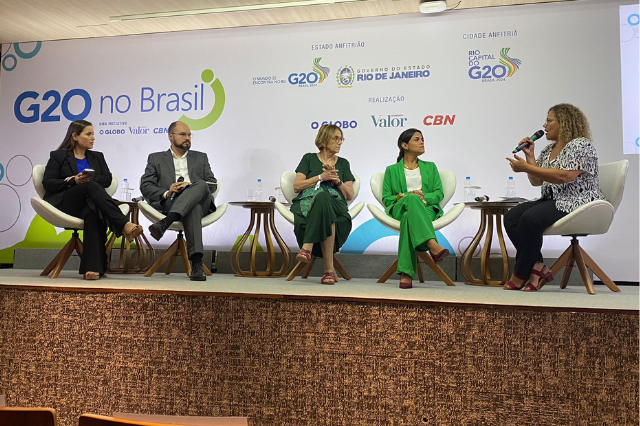ABC participates in debate about the Brazilian presidency in the G20
For the first time, Brazil holds the rotating presidency of the G20, a group that gathers the world’s twenty largest economies. The media outlets O Globo, Valor Econômico, and CBN joined forces to conduct the G20 series in Brazil, addressing the main topics of Brazilian leadership. The president of the Brazilian Academy of Sciences (ABC), Helena Nader, who leads the Science20 (S20) focus group within the G20, was invited to participate in the first edition on March 20th.
During the roundtable discussion ‘What does civil society expect from Brazil?’, Nader emphasized that the main goal of Brazilian leadership in the S20 is to advocate for information sharing and technological transfer. ‘Rich countries fail to understand what underfunding science in the Global South means. They don’t see that publishing a paper in Science today costs the same as years of funding here. Discrepancies in science affect all areas,’ she emphasized.
At the first S20 meeting in 2024, the ABC suggested five priorities for the group’s discussions: Artificial Intelligence; Bioeconomy; Energy Transition; Health and Social Justice. The president of the ABC highlighted that all these topics are in line with the United Nations’ Sustainable Development Goals (SDGs), in the development of which Brazil actively participated. ‘Here we have several organized civil society groups and our points are common. We need to converge; the more we do that, the greater the chance that the final documents will have an impact at the G20 Summit in November,’ Nader concluded.

Constanza Negri, Henrique Frota, Helena Nader, Beatriz Motta and Cassia Almeida (mediator)
Other representatives of civil society
Beatriz Motta, research coordinator of the Cipó Platform, who focused on the climate issue. The Cipó Platform is an independent research institute that primarily works on the imperative of climate change from the perspective of the Global South. Motta addressed the cruel geopolitical injustice of climate change, where the countries emitting the least tend to be the most affected. She reminded that investing in mitigation and adaptation is crucial, but it’s not everything.
“Yes, there is indeed a lack of funding, but we cannot limit the debate to that. If we want to advance in a fair energy transition, for example, we cannot treat it as a purely technical issue at the expense of discussions about its social effects, especially for the populations of the territories where the actions will be implemented. Climate justice goes far beyond adequate investment,” she stated.
On the other hand, the president of the Brazilian Association of Non-Governmental Organizations (Abong), Henrique Frota, who heads the Civil20 (C20), pointed out that this engagement group is broader than the societies of the twenty countries, as it also includes nations not part of the bloc. For him, Brazil’s choice to prioritize combating hunger and taxing the super-rich are timely choices that are already being debated worldwide.
There is already talk, for example, of debt relief through internal investments in health; we can discuss the same for combating hunger. Even the USA, the world’s largest creditor, has started to embrace these propositions. The problem now lies with private creditors,’ he stated. ‘The G20’s proposal for taxing the super-rich involves a minimum tax rate. It’s important, but it doesn’t mean we’ll immediately see revenue growth for social programs. At this moment, it’s more about implementing these measures as a concrete political alternative,’ he concluded.
Constanza Negri, leader of the Business20 (B20), a focus group that brings together businesses and industries from around the world, emphasized that industrial policies can no longer be thought of on the same basis as in decades past. She argued that the focus of the focus groups needs to be less on diagnosis and more on solutions.
‘Our role in the B20 is not to talk about business; it’s to discuss what contributions the private sector can make to inclusive sustainable growth. Our main axes are combating hunger, achieving a fair energy transition, strengthening global production chains, fostering technological innovation, and valuing human capital. But these axes are not separate; they need to be integrated in the search for concrete measures,’ she said.
*Marcos Torres to BAS




